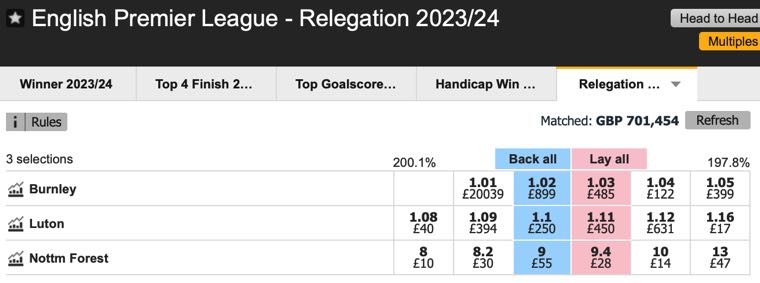 When it comes to playing league football, the first aim of the vast majority of teams is to avoid relegation. Whilst some sides like Liverpool and Manchester United might believe that winning the title is a fair ambition, most teams will simply want to remain in the league for another year.
When it comes to playing league football, the first aim of the vast majority of teams is to avoid relegation. Whilst some sides like Liverpool and Manchester United might believe that winning the title is a fair ambition, most teams will simply want to remain in the league for another year.
The threat of relegation is very real for some sides, which is why bookmakers allow you to bet on which teams will face the drop when the campaign reaches its conclusion. In some ways, it is the most basic of bets, being a winner if your chosen team is relegated and a lose if they don’t, but in other ways there is plenty to think about.
Things You Need to Think About

Placing a bet on which team or teams will be relegated might seem like an easy enough thing to do. Whenever the season starts, regardless of the league that you enjoy watching, everyone will have an opinion on which teams are likely to be the weakest. It will seem entirely reasonable before a ball is kicked to place a bet on team X to be relegated, perhaps because of how badly they are run or maybe on account of the fact that you don’t rate the manager. Maybe you’ve seen the players play before and think that they are mentally weak, unlikely to cope with the demands of what a season-long campaign demands of them.
In reality, though, it is much tougher than that to correctly work out which teams are going to end up being relegated out of the division at the end of the season. You might, for example, feel as though the newly promoted teams are the ones that are mostly likely to struggle, given the fact that they have not played in the league in the previous campaign and therefore might not know what the demands of it are. That is not always the case, however. The following is five seasons’ worth of data for the Premier League, looking at which teams were promoted at the start of the campaign and which were relegated at the end of it:
| Season | Promoted at the Start | Relegated at the End | Number of Promoted Teams Relegated |
|---|---|---|---|
| 2022-2023 | Fulham; Bournemouth; Nottingham Forest | Leicester City; Leeds United; Southampton | 0 |
| 2021-2022 | Norwich City; Watford; Brentford | Burnley; Watford; Norwich City | 2 |
| 2020-2021 | Leeds United; West Bromwich Albion; Fulham | Fulham; West Bromwich Albion; Sheffield United | 2 |
| 2019-2020 | Norwich City; Sheffield United; Aston Villa | Bournemouth; Watford; Norwich City | 1 |
| 2018-2019 | Wolverhampton Wanderers; Cardiff City; Fulham | Cardiff City; Fulham; Huddersfield Town | 2 |
You can see from that table that it is rare for all three promoted teams to get relegated straight away. Whilst some of them might do, it is far from a guarantee and therefore you need to consider that before placing your bet. Would you be confident you could work out which team or teams would survive?
Instead of looking only at which teams have been promoted, it is worth having a look at the likes of which sides had been struggling in the previous season, as well as the overall structure in place at the club. Is there a team that has lost its manager, or appears to be going through disagreements between the management team and the ownership? Has a side lost some crucial players who were the difference-makers the year before? These are all the sorts of questions that you need to ask yourself before betting on the relegation battle.
To Finish Bottom
It is also worth noting that some bookmakers allow you to place a wager on which team will finish bottom. This bet type is one that requires you to figure out which will be the worst-placed team come the end of the season, paying out if the team that you selected does indeed end up at the foot of the table and being a loser if they don’t. The odds for this are usually a bit higher than a bet on a side To Be Relegated, given the fact that there are commonly three spaces that will see a side hit with relegation whilst only one is available for a team to finish at the very bottom of the table, making it tougher to correctly predict.
That being said, all of the same sort of thoughts need to go into figuring out who is going to prop up the rest of the division. You need to think about the players that are there, the management team and the owners. You need to consider whether a team is able to cope with losing most weeks whilst still having enough mental fortitude to pick up enough points along the way to at least avoid finishing bottom. It is a tricky bet to place because of the countless different things that can happen during the course of the season that will see teams vacillate between the various positions in the table before the final positions are settled.
